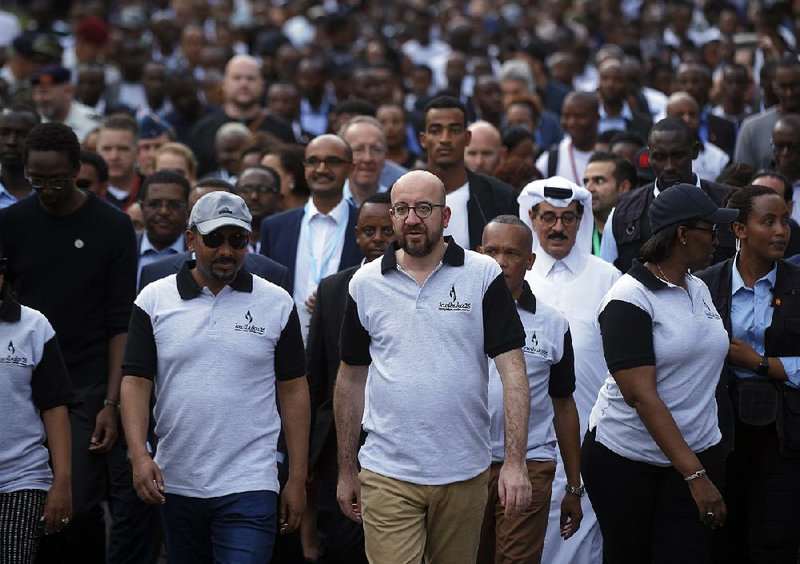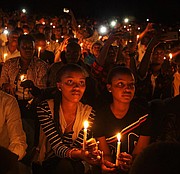KIGALI, Rwanda -- Twenty-five years after the start of its genocide, in which an estimated 800,000 to 1 million people were killed, Rwanda is rebuilding with hope, said President Paul Kagame.
Speaking at commemoration services Sunday, Kagame said that Rwandans would never again turn against each other.
"Our bodies and minds bear amputations and scars, but none of us is alone," said Kagame at the ceremony attended by several heads of state. "We Rwandans have granted ourselves a new beginning. We exist in a state of permanent commemoration, every day, in all that we do. ... Today, light radiates from this place."
Earlier in the day, Kagame and his wife laid wreaths and lit a flame at the mass burial ground of 250,000 victims at the Kigali Genocide Memorial Center in the capital, Kigali.
Those attending the ceremonies included the leaders of Chad, Republic of the Congo, Djibouti, Niger, Belgium, Canada, Ethiopia, as well as the African Union and the European Union.
"I am moved beyond words at this memorial to tragedy," said Jean-Claude Juncker, president of the European Commission. "Time can never erase the darkest hours in our history. It is our duty to remember."
Attending the ceremonies on behalf of France was Herve Berville, a survivor of the Rwandan genocide. Berville, 29, was evacuated by the French army at the age of 4 and adopted by a couple in Brittany.
Berville is now a member of France's parliament and of French President Emmanuel Macron's party.
The genocide has been a source of tension between Rwanda and France, though relations have warmed since Macron's election in 2017. Rwanda accuses France of complicity in the genocide and of helping some of the perpetrators escape.
Macron said Sunday that he wants to create a national day of remembrance on April 7, the date in 1994 when Rwanda's Hutu majority began systematically massacring members of the Tutsi minority.
Ibuka France, a group that advocates remembrance of the genocide, praised Macron's announcement. Marcel Kabanda, the head of the group, told Agence France-Presse that Ibuka France had suggested the idea in a meeting with Macron on Friday.
Macron did not say what the day of commemoration would entail or how he would create it. He could proceed by decree, or have his government present a bill in parliament.
France has also been accused of providing weapons and military training to the Hutu-dominated government in the years that led up to the genocide. Macron on Friday also ordered a commission of researchers and historians to investigate the "role and involvement of France" in Rwanda from 1990-1994. It is to make conclusions within two years.
Remembrances were held Sunday in France. A survivor of the genocide, speaking at a commemoration in a park in Paris, noted how arbitrary killings could be with "people killing some and saving others."
Alain Ngirinshuti, who lost family members in the massacres, said that after surviving an April 7, 1994, attack by soldiers and militia at a convent school, he faced a militiaman in a Kigali hospital "taking people to be killed."
When the militiaman reached Ngirinshuti, he told him, "I don't like that youngsters are killed" and asked if he wanted to eat. He told Ngirinshuti he'd return the next day, and "he came and gave me a tin of sardines."
Ngirinshuti said his life "was hanging by a thread" but "you had situations like that, people killing some and saving others."
On Sunday in Rwanda, songs, poems and plays about the nation's rebirth were performed at the Kigali convention center.
Belgian Prime Minister Charles Michel said "the duty of remembrance must be a sacred requirement." Belgian peacekeepers were among those killed in Rwanda during the genocide.
The Ethiopian prime minister expressed solidarity with Rwandans and said under Kagame's leadership, the seeds of unity had been sowed.
The mass killing of Rwanda's Tutsi minority was ignited on April 6, 1994, when a plane carrying President Juvenal Habyarimana was shot down and crashed in Kigali, killing the leader who, like the majority of Rwandans, was an ethnic Hutu.
The Tutsi minority was blamed for downing the plane, and the bands of Hutu extremists began slaughtering the Tutsi, with support from the army, police and militias.
Kagame's government has accused the Hutu-led government of 1994 of being responsible for shooting down the plane. Other Rwandans also blame the 1994 government for a host of ills.
"Twenty-five years ago, Rwanda fell into a deep ditch due to bad leadership, today, we are a country of hope and a nation elevated," Agnes Mutamba, 25, a teacher who was born during the genocide, told The Associated Press in Kigali.
Information for this article was contributed by Ignatius Ssuuna and staff members of The Associated Press; and by Aurelien Breeden of The New York Times.
A Section on 04/08/2019

